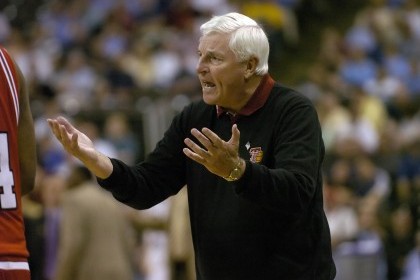With the start of yet another basketball season, excitement has swept the campus. However, with the change of sport seasons come new controversies. Recently Holy Cross’ women’s basketball coach Bill Gibbons was put on paid administrative leave for allegedly verbally and physically abusing players on his team. Gibbons is not the lone coach in this type of abuse controversy. In April, Rutgers University men’s basketball coach Mike Rice was fired after a video was released showing Rice physically and verbally abusing his players. Now this season, to start the year off, we have Gibbons.
Former Holy Cross players and coaches responded in support of Gibbons, claiming the lawsuit depicted a man who was “far from the Coach Gibbons we know.” These conflicting reports lead one question to arise: has the college coaching occupation become one of the hardest tasks in the world? Contributing to this question is the fact that the fine line between strict discipline and abuse is becoming thinner and thinner.
The college coaching profession is very different from professional coaching. In professional leagues, the players a coach deals with are committed to their craft; they strive to get better, and regardless of their attitudes or personalities they are motivated by their will to make money by listening to coaching. However, when a college coach is faced with the task of trying to guide teenagers and young adults, most of whom will not make it to the pro’s, things become very tricky. There will be days when young student-athletes show their attitude, rebel, question why they are playing the sport and lack motivation. It is the coaches’ job to instill a positive mindset and make sure his student-athletes follow his every command. It is much harder to guide an individual who is still trying to find their niche in life, like college students, as opposed to professional athletes who, for the most part, have their priorities in order.
This difficulty of dealing with different personalities of student-athletes leads coaches to become susceptible to losing their temper, which is a perfectly human trait. However, a problem arises when a certain tipping point is reached: for example, using racial slurs towards your players or hitting them. College athletes, especially the ones on scholarship, are very much at the mercy of the university and ultimately their coach. They occasionally fall into a mindset that they have to act tough and handle all of their coach’s challenges regardless of how irrational or unfair they seem. This student-athlete mindset gives coaches a certain power-trip. Such false power-trips lead coaches to lose sight of their actions, which might become out of character and hurtful towards their players, but seem normal to themselves. This gave way to coaches like Bob Knight, a notoriously short-tempered individual who was considered prolific for Indiana and Texas Tech despite his reputation for his temper tantrums.
But with the high incorporation of social media in the lives of college students, I believe a lot more of these harsh coaches are being exposed. Instead of simply transferring or going to a higher authority, student-athletes look for help and support through Twitter and other forms of communication. Not only is this helping to locate all of the injustices committed by coaches, who are typically seen as “normal,” it also helps unveil the commendable coaches within the sport. For example Jay Bilas, former Duke basketball player, said about his former coach, Mike Kryzewski, “My college coach cursed a lot, but he never was demeaning. He challenged us. He used some blue language. But he never was demeaning.” Such language not only helps illuminate all of the good in the coaching world, but it also silences the critics who believe “being tough” and “breaking athletes down” is the only way to coach.
College coaches have a hard occupation because they not only have to worry about being successful, but also how to deal with emotions of their young and developing players. When dealing with such fluctuating matters as emotions, anger is bound to strike at some point. However, it is how coaches handle that anger that will be seen and judged. I believe the best coaches are the ones who can give off a hard-nosed persona but never come off demeaning like Kryzewski. Nonetheless, I also feel that college coaches who are first-time offenders of crossing the line should be looked at as people dealing with young adults, not as robots who can never get frustrated. A punishment is necessary but a termination of employment seems slightly harsh.
Dennis Topakov is a Collegian columnist and can be reached at [email protected].













Taylor Kale • Apr 7, 2022 at 3:30 pm
Dennis, how do you feel about this almost 10 years later? Has this intensified or diminished?